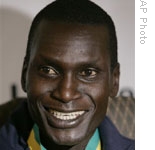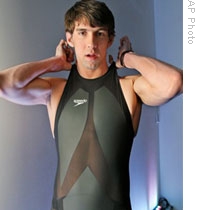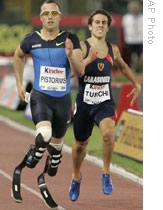VOA慢速英语-EXPLORATIONS - Going for the Gold at the Olympics in
时间:2018-12-15 作者:英语课 分类:VOA慢速英语2008年(七)月
The Olympics are about sports, fair play and national pride.
22 July 2008
VOICE ONE:
I'm Steve Ember.
VOICE TWO:
And I'm Barbara Klein with EXPLORATIONS in VOA Special English. Today we tell about the two thousand eight summer Olympic games. They open August eighth in China's capital, Beijing.
(MUSIC)
VOICE ONE:

Newly prepared Wulihe Stadium in Shenyang. Twelve Olympic soccer games will be held here.
More than ten thousand men and women will compete for twenty-one days at the Beijing Olympics. They are representing more than two hundred nations. National pride is an important part of the Olympic games. For example, Aminata Diouf will leave her beauty care business in Senegal to represent her country in track and field. This will be her third trip to the Olympics. She says the experience is always emotional.
AMINATA DIOUF: "I feel like an ambassador 1, who is very proud. It is this motivation that makes you want to train at two hundred percent of your abilities. The goal is to satisfy an entire nation."
VOICE TWO:
All of the competitors have the same dream -- to win a gold medal. But not all dreams are equal. Athletic 2 training costs a lot of money. So athletes from industrial countries usually win more medals than those from developing countries. How a country pays for its Olympic program shows that nation's social and political values.
VOICE ONE:
In Kenya, for example, the government pays all the costs for the country's Olympic program. The Kenyan Athletic Association says its budget is about one million, five hundred thousand dollars. It plans to send eighty athletes to the Beijing Olympics.

Robert Cheruiyot
One of Kenya's best hopes for an Olympic medal is Robert Cheruiyot. He is known in the United States for running in the Boston Marathon. He has won the race four times. He says: "When I am running I can hear the national song of Kenya. When I train I can hear Kenya's national song." But the runner has not received any money from the Kenyan government to prepare for the Olympics in Beijing.
VOICE TWO:
David Wallechinsky has written several books about the Olympics. He says some government-supported Olympic programs are poorly operated.
DAVID WALLECHINSKY: "The problem is, like anything else you put the government in charge of, there is a certain amount of corruption 3 in most of these countries. A lot of the officials take most of the money, and it doesn't really get to the athletes. Not all countries are like that, but it is quite common."
VOICE ONE:
In Russia, public money and donations from private businesses support Olympic athletes. But Russian Olympic cyclist Sergei Ruban says some donors 4 are only interested in sports that are popular on television. He says companies want the attention that comes from being linked to popular athletes.
The United States is one of only three countries where Olympic athletes receive no government money. Instead, the United States Olympic Committee receives money from the sale of television broadcast rights and donations from businesses.
VOICE TWO:
Steve Roush is chief of sports performance with the United States Olympic Committee. He says America's Olympic program must compete for financial support with professional sports teams.
Mister Roush says that, like in Russia, businesses in the United States like popular sports more than others. Many Olympic gold medal winners from the United States later make millions of dollars by advertising 5 products. These include the top swimmers and gymnasts.
However, some private projects support athletes in less popular sports like distance running. For example, Keith Hanson and his brother own shoe stores in Detroit, Michigan. They provide distance runners with free housing, health care, training, free running shoes and part-time jobs in their stores.
(MUSIC)
VOICE ONE:
The Olympic games include more than three hundred sporting events. Professional athletes will compete in many events, like swimming and basketball. But many athletes who have never earned money from sports will compete in other events. These amateur 6 athletes will probably never become rich or famous. They must balance work at their jobs with training. They also struggle to pay for their own travel and other costs. Still they do it all for the chance to seek the Olympic dream.
For example, Cambodian runner Hem 7 Bun Ping receives some government support, about thirty dollars a month. But he says he cannot pay for the diet he needs to compete against professional athletes. Still, he says, he will do his best.
VOICE TWO:
Steve Roush of the United States Olympic Committee notes that common people all around the world work very hard to win a place on an Olympic team.
STEVE ROUSH: "I think it's the purity 8 of the Olympics that changes people's mindset. I also think there is a thing that I refer to as Olympic fever. Sometimes when you catch that, it's very hard to do anything but pursue it."
Mister Roush says the general public still likes amateur athletes better than professionals because they are sacrificing so much. He says the amateur athletes who compete in Beijing will influence Olympic hopefuls around the world.
(MUSIC)
VOICE ONE:
The International Olympic Committee bans the use of drugs that improve performance. The World Anti-Doping Agency says the drugs threaten the quality of the competition and also may cause health risks. Yet some athletes have reportedly been using banned substances like steroids to improve their performance for years.
Last year, American runner Marion Jones admitted that she lied to investigators 9 about using performance-enhancing drugs. The five medals she won at the two thousand Olympics were taken away from her. And she was sentenced to six months in prison. Experts say this sends a message that performance-enhancing drugs are not accepted.
VOICE TWO:
The United States Anti-Doping Agency is supposed to guarantee that no athletes use such drugs. It performs eight thousand tests a year on American Olympians to find evidence of banned drugs like steroids. These drugs can build muscle but also may lead to kidney 10 disease and cancer. The agency provides guidance about which drugs are banned. And it punishes athletes who violate 11 the rules.
VOICE ONE:
Most countries now have programs to test and help Olympic athletes. For example, South Korea's Olympic program urges athletes to talk to medical experts before taking any medicines. Jang Sung-ho is a former Olympic medal winner. He said Olympic athletes today are careful because past athletes lost medals for unknowingly using banned substances.
For example, he said a runner once broke the rules by taking cold medicine that he bought in a drug store. Now all South Korean athletes get such medicines from their training center.
VOICE TWO:
Increased education and enforcement have made cheating with drugs more difficult. But experts say it is still possible. Peter Sonksen is a professor at Saint 12 Thomas Hospital in London. He has advised the International Olympic Committee on doping. Doctor Sonksen says new drugs like human growth hormone 13 are hard to discover in drug tests. He says new tests should be developed to keep sports free of drugs. Anti-doping officials say most athletes welcome increased testing as a way to guarantee the honesty of the Olympic games.
(MUSIC)
VOICE ONE:

American gold medalist and world record holder 14 Michael Phelps wearing an LZR swimsuit
Technology has long been used in sports to improve athletic performance. But this helps athletes in countries that have more technology.
For example, the International Sports Federation 15 approved the use of a high-tech 16 swimsuit called the LZR Racer. It reduces form drag while the athlete is swimming quickly through the water. It also helps keep the athlete's body position in the water. Athletes wearing the LZR Racer have broken more than forty world swimming records since February. The swimsuit costs more than five hundred dollars. Critics have compared it to taking performance-enhancing drugs.
VOICE TWO:

Oscar Pistorius
Technology also has helped South African runner Oscar Pistorius, who lost both his legs. He uses two specially 17 made legs that have racing 18 blades as feet. At first, the International Association of Athletics 19 Federations 20 barred him from competing. It said his man-made legs would permit him to run faster without working as hard as he would on two real legs.
Later, Pistorius won a decision permitting him to compete. But he failed to run fast enough during time trials last week. So he was not chosen for South Africa's Olympic team.
Some Olympic officials say technology may not be so important after all. They say the competitions will be decided 21 by the ability and hard work of the athletes.
(MUSIC)
VOICE ONE:
This program was written by Brian Padden and adapted by Shelley Gollust. Our producer was Lawan Davis. I'm Steve Ember.
VOICE TWO:
And I'm Barbara Klein. You can download audio and read scripts on our Web site, voaspecialenglish.com. Join us again next week for Explorations in VOA Special English.
- He took up office as an ambassador for ten years continuously.他连任十年大使。
- The new ambassador is more mature than his predecessor.新大使比他的前任更成熟一些。
- This area has been marked off for athletic practice.这块地方被划出来供体育训练之用。
- He is an athletic star.他是一个运动明星。
- The people asked the government to hit out against corruption and theft.人民要求政府严惩贪污盗窃。
- The old man reviled against corruption.那老人痛斥了贪污舞弊。
- Please email us to be removed from our active list of blood donors. 假如你想把自己的名字从献血联系人名单中删去,请给我们发电子邮件。
- About half this amount comes from individual donors and bequests. 这笔钱大约有一半来自个人捐赠及遗赠。 来自《简明英汉词典》
- Can you give me any advice on getting into advertising? 你能指点我如何涉足广告业吗?
- The advertising campaign is aimed primarily at young people. 这个广告宣传运动主要是针对年轻人的。
- He made an amateur attempt to build a cupboard.他很外行地试做了一个碗柜。
- Although Tom's only an amateur he's a first-class player.虽然汤姆只是个业余爱好者,但却是一流的高手。
- The hem on her skirt needs sewing.她裙子上的褶边需要缝一缝。
- The hem of your dress needs to be let down an inch.你衣服的折边有必要放长1英寸。
- She was a woman of purity and goodness.她是一位纯洁善良的妇女。
- The white colour is a symbol of purity.白色是纯洁的象征。
- This memo could be the smoking gun that investigators have been looking for. 这份备忘录可能是调查人员一直在寻找的证据。
- The team consisted of six investigators and two secretaries. 这个团队由六个调查人员和两个秘书组成。 来自《简明英汉词典》
- Several of the patients had received kidney transplant.病人中有几位已接受了肾移植手术。
- The operation to transplant a kidney is now fairly routine.肾脏移植手术如今已相当常见。
- Those who violate traffic regulations should be punished.那些违反交通规定的人应该受处罚。
- Can they be allowed to violate rules and regulations at will?难道能容许他们随心所欲地破坏规章制度吗?
- He was made a saint.他被封为圣人。
- The saint had a lowly heart.圣人有谦诚之心。
- Hormone implants are used as growth boosters.激素植入物被用作生长辅助剂。
- This hormone interacts closely with other hormones in the body.这种荷尔蒙与体內其他荷尔蒙紧密地相互作用。
- The holder of the office of chairman is reponsible for arranging meetings.担任主席职位的人负责安排会议。
- That runner is the holder of the world record for the hundred-yard dash.那位运动员是一百码赛跑世界纪录的保持者。
- It is a federation of 10 regional unions.它是由十个地方工会结合成的联合会。
- Mr.Putin was inaugurated as the President of the Russian Federation.普京正式就任俄罗斯联邦总统。
- The economy is in the upswing which makes high-tech services in more demand too.经济在蓬勃发展,这就使对高科技服务的需求量也在加大。
- The quest of a cure for disease with high-tech has never ceased. 人们希望运用高科技治疗疾病的追求从未停止过。
- They are specially packaged so that they stack easily.它们经过特别包装以便于堆放。
- The machine was designed specially for demolishing old buildings.这种机器是专为拆毁旧楼房而设计的。
- I was watching the racing on television last night.昨晚我在电视上看赛马。
- The two racing drivers fenced for a chance to gain the lead.两个赛车手伺机竞相领先。
- When I was at school I was always hopeless at athletics.我上学的时候体育十分糟糕。
- Our team tied with theirs in athletics.在田径比赛中,我们队与他们队旗鼓相当。
- These problems are women's special problems and special work of women's federations. 这样的问题,就是妇女的特殊问题,就是妇联的特殊工作。 来自互联网
- The Bridge Federate is a feasible solution to achieve multi-federations interconnection. 基于桥接成员实现多联邦互连是目前较为通用和可行的方法。 来自互联网